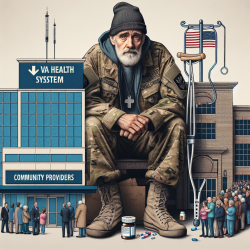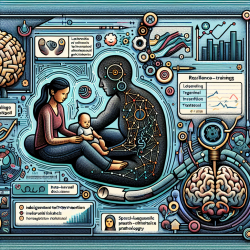The healthcare system can often feel like a complex maze, especially for homeless veterans who rely on both VA and non-VA services. Community providers face significant hurdles in coordinating care for these individuals, leading to fragmented services and unmet health needs. The research article "Walking in a maze": community providers’ difficulties coordinating health care for homeless patients sheds light on these challenges and offers insights into potential solutions.
Understanding the Dual Use Dilemma
The term "dual use" refers to veterans accessing both VA and non-VA healthcare services. While this may increase access to care, it also introduces complications such as poor communication among providers, incomplete treatment plans, and increased healthcare costs. Homeless veterans, who often have multiple medical and psychosocial issues, are particularly vulnerable to these negative effects.
The Study's Findings
The study conducted three focus groups with medical, dental, and behavioral health providers from a Health Care for the Homeless (HCH) program. The findings highlighted several key challenges:
- Lack of Knowledge: Providers struggled with understanding the VA system and its eligibility criteria. This lack of knowledge made it difficult to guide veterans through the system effectively.
- Poor Communication: There were no clear lines of communication between HCH programs and VA medical centers. This led to inefficiencies and potential safety risks due to medication duplications.
- No Access to Medical Records: Providers could not access VA medical records, which hindered their ability to provide comprehensive care.
- Lack of Collaboration: Despite having complementary expertise, there was little collaboration between HCH programs and the VA.
Recommendations for Improvement
The study suggests several strategies to enhance coordination between VA and non-VA providers:
- Education: Implement a "VA 101" training course for non-VA providers to better understand the VA system and its services.
- Communication: Establish clear communication channels between HCH programs and VA medical centers. Designate contact persons in each organization to facilitate information exchange.
- Access to Medical Records: Allow non-VA providers access to electronic medical records through systems like My HealtheVet or develop a continuity of care record (CCR).
- Create Formal Partnerships: Encourage collaboration through formal partnerships between the VA and organizations like the National Health Care for the Homeless Council.
The Path Forward
The challenges faced by homeless veterans in accessing coordinated healthcare are not unique to the U.S.; similar issues arise globally in settings with vulnerable populations. Addressing these challenges requires a concerted effort from both VA and non-VA entities to improve education, communication, record access, and collaboration.
This research provides a foundation for further exploration into how we can better serve homeless veterans. By implementing these recommendations, we can work towards a more integrated healthcare system that meets the needs of all veterans.
If you're interested in delving deeper into this topic, I encourage you to read the original research paper: “Walking in a maze”: community providers’ difficulties coordinating health care for homeless patients.










